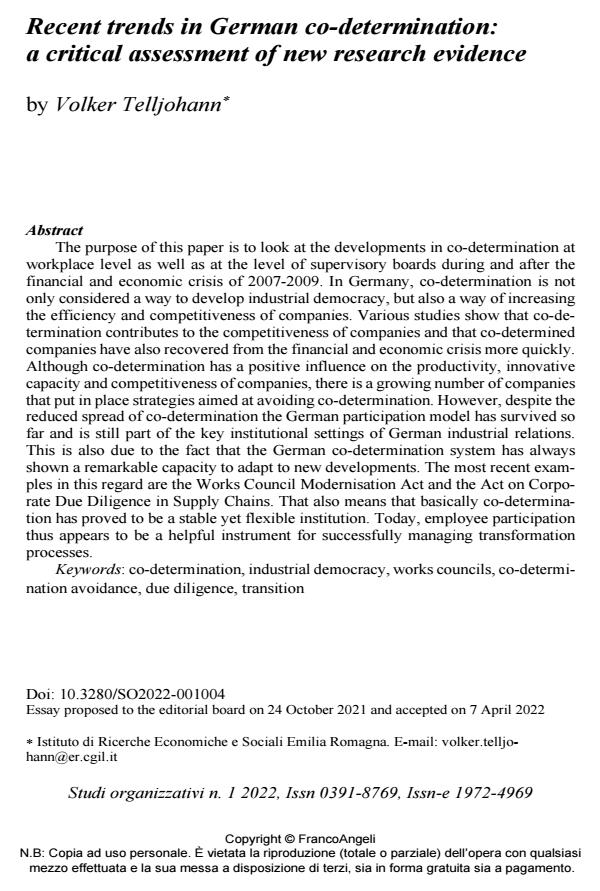Recent trends in German co-determination: a critical assessment of new research evidence
Journal title STUDI ORGANIZZATIVI
Author/s Volker Telljohann
Publishing Year 2022 Issue 2022/1
Language English Pages 25 P. 83-107 File size 274 KB
DOI 10.3280/SO2022-001004
DOI is like a bar code for intellectual property: to have more infomation
click here
Below, you can see the article first page
If you want to buy this article in PDF format, you can do it, following the instructions to buy download credits

FrancoAngeli is member of Publishers International Linking Association, Inc (PILA), a not-for-profit association which run the CrossRef service enabling links to and from online scholarly content.
The purpose of this paper is to look at the developments in co-determination at workplace level as well as at the level of supervisory boards during and after the financial and economic crisis of 2007-2009. In Germany, co-determination is not only considered a way to develop industrial democracy, but also a way of increasing the efficiency and competitiveness of companies. Various studies show that co-determination contributes to the competitiveness of companies and that co-determined companies have also recovered from the financial and economic crisis more quickly. Although co-determination has a positive influence on the productivity, innovative capacity and competitiveness of companies, there is a growing number of companies that put in place strategies aimed at avoiding co-determination. However, despite the reduced spread of co-determination the German participation model has survived so far and is still part of the key institutional settings of German industrial relations. This is also due to the fact that the German co-determination system has always shown a remarkable capacity to adapt to new developments. The most recent examples in this regard are the Works Council Modernisation Act and the Act on Corporate Due Diligence in Supply Chains. That also means that basically co-determination has proved to be a stable yet flexible institution. Today, employee participation thus appears to be a helpful instrument for successfully managing transformation processes.
Keywords: Co-determination, industrial democracy, works councils, co-determination avoidance, due diligence, transition
- Employee participation at company level: institutions, articulation and challenges Thomas Haipeter, Sophie Rosenbohm, Volker Telljohann, in Transfer: European Review of Labour and Research /2024 pp.421
DOI: 10.1177/10242589241282402 - Workplaces as Schools of Democratic Resilience? Conceptual Considerations About the Spillover Effect Markus Pausch, in Analyse & Kritik /2025 pp.31
DOI: 10.1515/auk-2025-2007
Volker Telljohann, Recent trends in German co-determination: a critical assessment of new research evidence in "STUDI ORGANIZZATIVI " 1/2022, pp 83-107, DOI: 10.3280/SO2022-001004